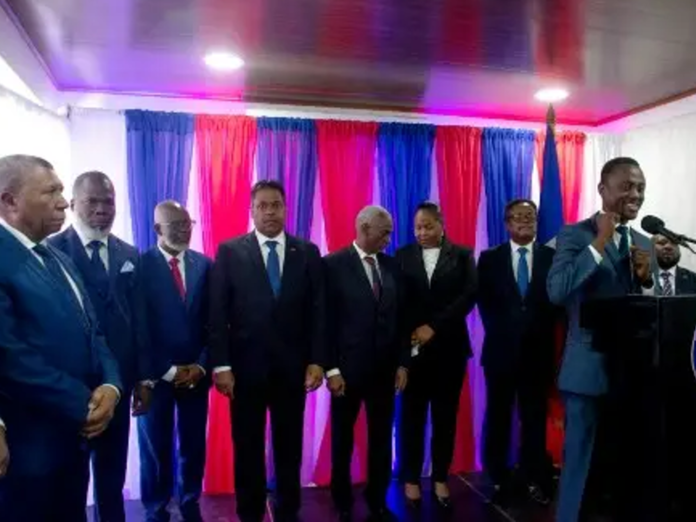
PORT-AU-PRINCE, Haiti (AFP)— A long-awaited transitional ruling council was sworn in Thursday in violence-wracked Haiti, while the Caribbean nation’s embattled prime minister Ariel Henry submitted his formal resignation.
The installation of the nine-member Presidential Transitional Council marks the first step to forming a new government after months of chaos following gang warfare.
Images shared on social media showed the council members greeted with fanfare at the presidential palace in Port-au-Prince, and the head of a party represented in the body confirmed to AFP that they had taken an oath of office.
The council — made up of eight men and one woman — is to attend an official inauguration ceremony, which an official press invitation said would be held at the prime minister’s office, known as the Villa d’Accueil.
Meanwhile, Henry — who had promised in March to step down when a council was installed — thanked the Haitian people “for the opportunity to serve our country with integrity, wisdom, and honour.”
“Haiti will be reborn,” he wrote in his resignation letter, which was released Thursday but dated Wednesday from Los Angeles.
Pending the formation of a new government, economy minister Michel Patrick Boisvert was appointed as interim prime minister, the outgoing cabinet said.
Boisvert had already taken over some official communications in recent weeks, with Henry in the United States and unable to return to his country after a trip to Kenya.
The council, whose installation was delayed multiple times by weeks of infighting, is now tasked with getting the country ready for new elections by 2026.
After facing a series of crises, including economic vulnerability and natural disasters, Haiti’s political instability has only worsened since the 2021 assassination of President Jovenel Moise.
The country of 11.6 million has no sitting legislature and has not held elections since 2016.
It is unknown how the country’s powerful gangs will respond to the new council, made up of figures from across Haiti’s political spectrum, after voicing anger at their exclusion from transitional talks.
Gang leader Jimmy “Barbecue” Cherizier, whose 1,000-member G9 alliance controls parts of Port-au-Prince, was among those excluded.
The violence, exacerbated by prison breakouts in February, has sparked a worsening humanitarian crisis in Haiti, with aid agencies pleading for help amid growing hunger, surging poverty, and a lack of health care.
The United Nations says some 360,000 Haitians are internally displaced, with the gang violence forcing 95,000 people to flee the capital and pushing five million into “acute hunger.”
Last year, a UN-backed force led by Kenya was tasked with deploying to the country and helping its beleaguered police rein in criminal gangs.
Kenya then said it had put plans on deploying the force on hold until the transitional council was stood up.

